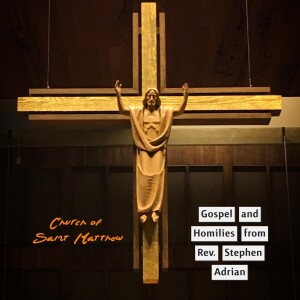
Wednesday Apr 19, 2023
10.31.2020 Homily
We celebrate today the feast of all saints. Saints are men and women who have lived their Christian life in an extraordinary way. And there are all different kinds of saints, a great variety of saints. But to understand the truth of the gospel, I think it is good to go to those lives of the saints, because they're the ones who, we are told, lived out the truth of the gospel in an exemplary fashion. And I would suggest going to the lives of the saints who are, if you will current, if they are part of our culture, people like Dorothy Day, and Thomas Merton, and Walker Percy. And then from a few years back, people like Mother Cabrini or Elizabeth Ann Seton. Those are people who are part of our culture, part of our history, part of what it is that we are. And they in so many others lived extraordinary lives.
Well, I'd like to take just a moment this afternoon and reflect on one of them, and that is Thomas Merton. It was November 16th of 1938 when Thomas Merton was baptized and received his First Communion at Corpus Christi Church on 121st Street in New York City. Four of his friends were there. This was early in the morning, it was the early mass. One of his friends, Edward Rice, served as the witness, as the godfather. And three other friends, all of whom were Jewish, were there to share in Thomas' experience--Robert Lax, Cy Freedgood, and Bob Gurdy. Robert Lax would be interviewed many years later and he talked about what he thought drew Thomas Merton to Catholicism. And I would suggest that what he saw in Thomas Merton ultimately occurred in his own life, as he too entered the church years later. He said, "I think the feeling of God's love for the world--God's mercy to sinners; I think that made an actual strong appeal to Thomas. I think it never occurred to him that this was at the very center of Christianity.”
Now in Thomas' own words in his autobiography, he writes this, “Robert Lax and I were walking down Sixth Avenue one night in the spring. The street was all torn up and trenched and banked with dirt, and marked out with red lanterns where they were digging the subway. We picked our way along the front of the dark little stores going downtown to Greenwich village. I forgot what we were arguing about, but in the end, Lax turned to me suddenly and said the question, “What do you want to be anyway?” I said, “I don't know. I guess what I want to be is to be a good Catholic.” He said, “What do you mean, you want to be a good Catholic?” Now the answer I gave was pretty lame, and it expressed my confusion and how little I had really thought about it at all. Lax did not accept that. He said to me, “What you should say is that you want to be a saint.”
It struck me--a saint. That's a little weird for me. How can I expect to be a saint?” Lax said, “By wanting to be a saint. “I can't be a saint. I can't be a saint,” I said, my mind darkened with confusion. The knowledge of my own sins, the false humility, which makes one say they cannot do the things that they must do and cannot reach the level that they must reach, this cowardice said, “I am satisfied to save my own soul and keep out of mortal sin.” What that really means is I really do not want to give up my sins and my attachments. Lax said to me, “All that is necessary to be a saint is to want to be one. Don't you believe that God will make you what he created you to be if you will consent to let him go do it? All you have to do is to desire it.”
The next day, when I went to Columbia University, I spoke to one of our teachers, Mark van Doren. I said, “Lax is going around saying that all one needs to do to be a saint is to want to be one. Mark Van Doren smiled at me. And he said, “Of course. He was absolutely right.”
Well, that's true about every single one of us, there is nothing we have to do to be a saint. God will do it all. What I need to do is to let him do it, to desire it enough to open my heart and my soul, my mind, and my spirit and let him enter in, let him do what he wants to do.
Thomas Merton wrote his biography in the early forties, The Seven Story Mountain. It was a best seller throughout this country for months and months. Men and women, Catholic and non-Catholic, were attracted to this book. And the story of his life, his conversion is coming into the monastery. There was something about the Merton story that touched the hearts of people in the 1940s and 1950s. The only time I ever saw my father read a book, I was five or six years old and he had his copy of The Seven Story Mountain. And I remember after supper in the evening, he would sit at the kitchen table and he'd read day after day after day.
The truth that is found in Merton's biography is the truth that should be found in ours. All of us can be a saint. All it is is that we need to want it.
No comments yet. Be the first to say something!